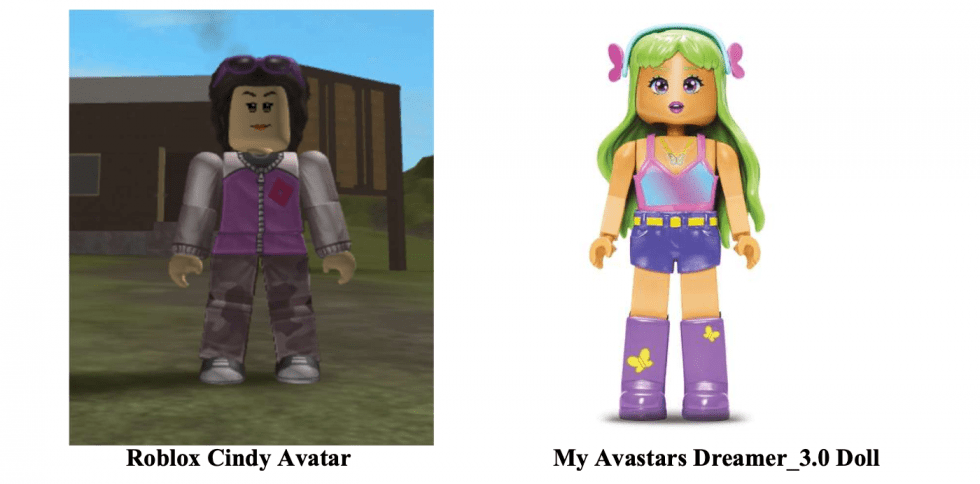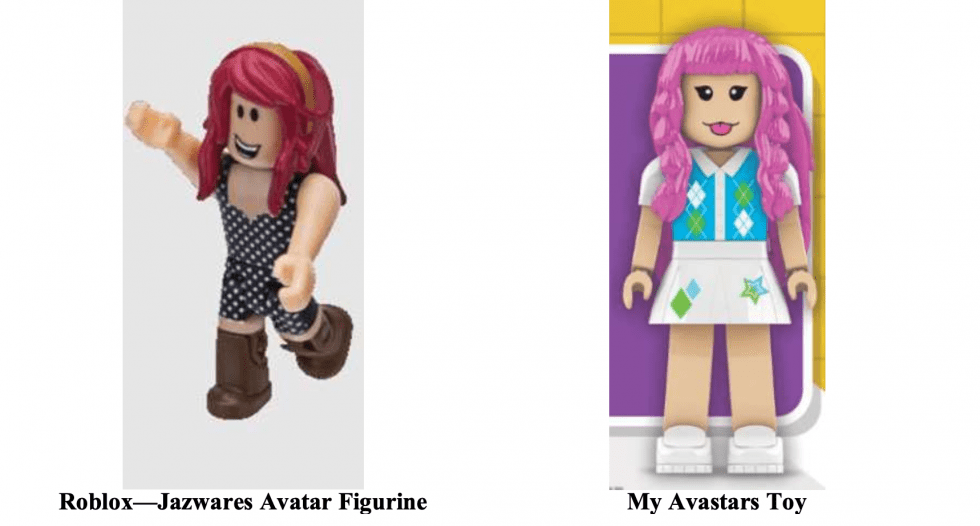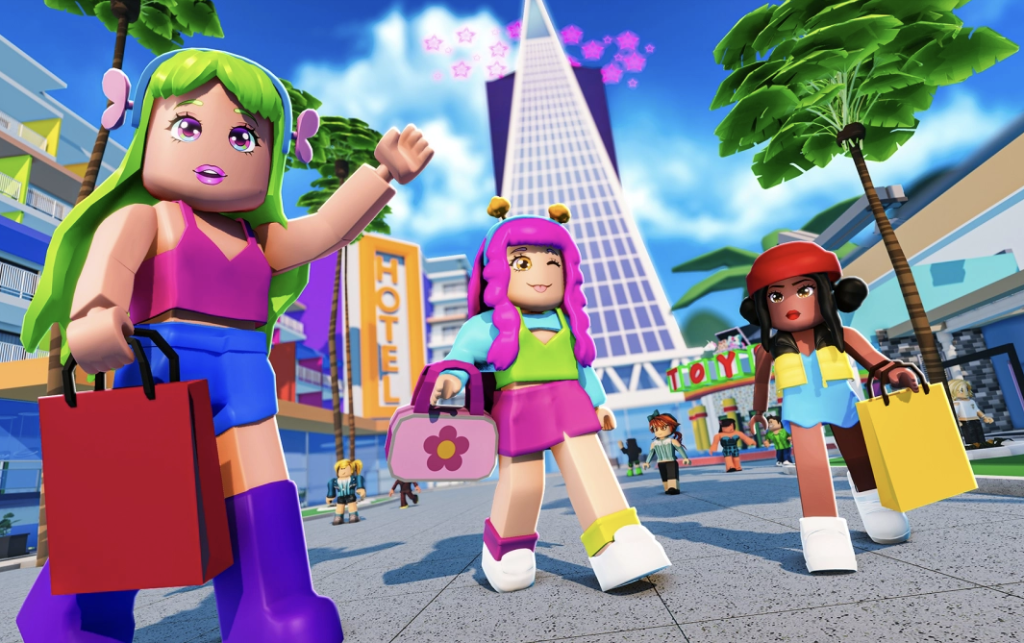A California federal court has refused to dismiss the bulk of the lawsuit that Roblox lodged against WowWee last summer, accusing the toy company of copying its “wildly successful avatar intellectual property to create and sell a line of physical dolls to exploit Roblox’s investment, creative efforts, and popularity in the marketplace.” In response to the complaint that Roblox lodged with the U.S. District Court for the Northern District of California in July 2022, in which it alleges that WowWee is “manufactur[ing], promot[ing], and sell[ing] a line of dolls called ‘My Avastars’” that it “copied directly from Roblox’s Classic Avatars,” WowWee argued that Roblox failed to adequately plead its copyright and trademark infringement claims, while also asserting that its intentional interference with contractual relations and breach of contract claims should be tossed out in favor of arbitration.
In an order dated March 9, N.D. Cal. Judge Susan Illston found that Roblox adequately pled ownership of a valid copyright for several of its avatars but fell on short for others. Roblox’s claim that it owns valid copyrights for the Cindy, Lindsey, Kenneth, and Dennis avatars is adequately pled, according to Judge Illston, whereas she dismissed claims based on the Stylz Salon Stylist, Brookhaven Customer, and Claire Dancefiend avatars and figurines because they were based on late-registered works. (Those works were registered after Roblox filed its initial complaint but before it filed its amended complaint, which is an issue, as Fourth Estate bars plaintiffs from amending an action to include claims for works not registered before the filing of the initial complaint.)
Still yet, the court also dismissed metaverse platform Roblox’s claims based on the Avatar “bases” (i.e., the “templates from which other avatars are customized on the Roblox platform”), as Roblox failed to sufficiently allege that these works are the subject of copyright registrations.
As for substantial similarity between its Cindy, Lindsey, Kenneth, and Dennis avatars, and WowWee’s allegedly infringing Avastars, Roblox argued that both sets have “humanoid figures with cylindrical heads, C-shaped hands, block-shaped bodies and legs, square arms, and cartoon-like facial expressions that lack a nose.”

WowWee asserted in its defense that Roblox’s “claimed features are similar to LEGO features,” and while the court stated that “the features for which [Roblox] alleges protection are similar to those of other toys,” it observed that “there are differences, including the customizability of features of [Roblox’s] avatars and the shape of the avatars’ legs.” Given that “the ‘original selection, coordination, and arrangement’ of these features is protectible,” and that WowWee’s Avastars “are ‘virtually identical’ in shape to [Roblox’s] avatars,” the court found that Roblox sufficiently alleged substantial similarity – even though it held that “this is a close issue.”
Trade dress infringement – Turning to Roblox’s trade dress claim, the court notes that Roblox argues that its avatars “have a distinct overall look and feel stemming from at least their (1) humanoid, blocky shape; (2) cylindrical heads; (3) C-shaped hands; (4) block-shaped legs; (5) square or rounded arms; (6) cartoon-like facial expressions and lack of a nose; and (7) the particularized combination of these elements,” and have acquired distinctiveness “because the consuming public has come to associate [the avatar trade dress] with it, as shown by consumer comments on WowWee’s social media marketing videos, which confused WowWee’s products with [Roblox’s].”
WowWee claimed in response the lawsuit that Roblox “failed to clearly articulate [its] alleged trade dress or identify how the ‘generic’ elements … create a particular visual impression.” WowWee also argued that Roblox did not adequately plead that its trade dress has acquired secondary meaning. Nonetheless, the judge held that Roblox has adequately pled its trade dress claim, having “described a distinct trade dress” and “pled facts – namely, consumer confusion about whether defendants’ products were associated with Roblox – that show [its] trade dress was distinctive to consumers and acquired secondary meaning.”

Trademark Infringement, False Designation of Origin & False Advertising – Still yet, Roblox adequately pled these claims, which center on WowWee’s use of the ROBLOX mark to market and sell the Avastars dolls. While WowWee claimed that its use of the Roblox name qualifies as nominative fair use, and that the use of hashtags cannot constitute infringement, the court held that Roblox’s amended complaint “does not compel a finding that nominative fair use applies as a matter of law,” as Roblox alleges that WowWee’s “use of the Roblox name has implied an association with Roblox and has confused consumers.”
Specifically, the court pointed to Roblox’s allegations that WowWee advertised that the dolls at issue “would be sold with a code redeemable in a game on Roblox, used the hashtags #roblox and #newroblox to advertise the My Avastars dolls, and included the Roblox mark and interface in social media advertisements to promote confusion.” In terms of its hashtag-specific argument, the court clarified that use of a hashtag “can constitute trademark infringement when the use otherwise meets the test for trademark infringement.”
The court has granted WowWee leave to amend the dismissed claims by March 24.
Contract and Interference Claims – Finally, WowWee urged the court to compel arbitration of Roblox’s contract and interference claims based on an arbitration clause in Roblox’s terms. Shutting down Roblox’s argument that because it is only seeking injunctive relief for its contract and interference claims, the claims are excluded from arbitration, the court maintained that “because no exception to the arbitration provision applies,” the claims at issue are subject to mandatory arbitration for U.S. residents. (The court found that the claims are not arbitrable against the international defendants, including a couple of WowWee entities, and thus, stayed the proceedings against them on these claims pending the outcome of arbitration.)
THE BOTTOM LINE: Roblox says that by way of the lawsuit, it is looking “to halt WowWee’s blatant and admitted copying of [its] copyrighted works, and to put a stop to WowWee’s ongoing efforts to profit off of [its] trademarks, trade dress, and hard-won reputation and success.” The case is one of the latest examples of web3-centric squabbles playing out in court in the “real world.”
The case is Roblox Corp. et al, v. WowWee Group Limited, et al, 3:22-cv-04476 (N.D. Cal.)











